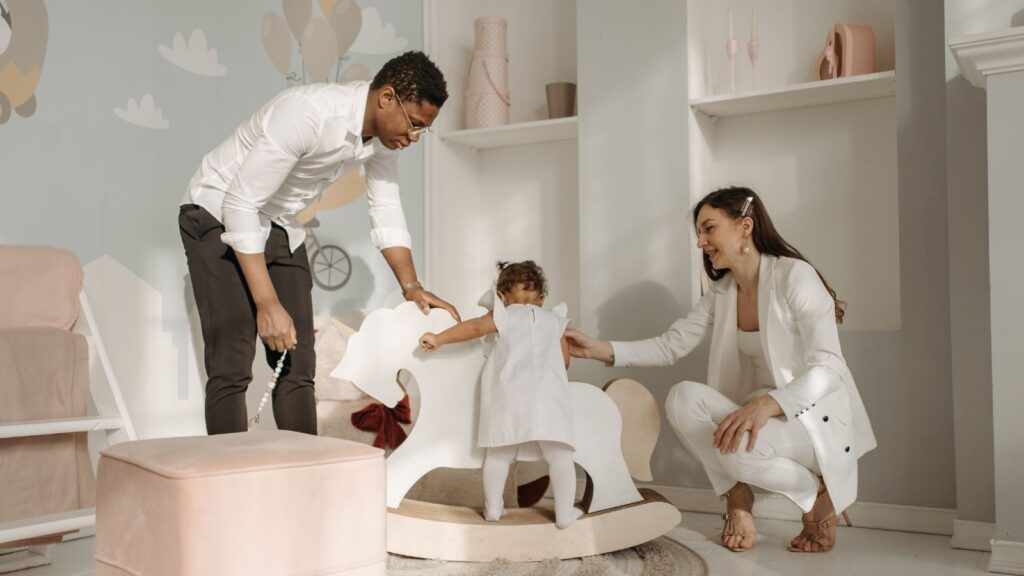Building a strong relationship with parents in childcare is essential for fostering trust, ensuring consistency in a child’s development, and creating a collaborative environment. Whether it’s a home-based setup or a professional baby daycare, parents and caregivers are partners in a child’s upbringing, and when they work together effectively, children benefit from stability and positive reinforcement.
A strong parent-caregiver relationship requires clear communication, mutual respect, and a shared approach to guiding children’s behavior. The Love and Logic approach emphasizes empathy, consistency, and logical consequences, making it a great foundation for fostering these relationships.
Here are three essential strategies to establish a positive relationship with parents in child care:
1. Build Trust Through Open And Honest Communication
Trust is the foundation of any healthy relationship, and this is especially true in child care. Parents need to feel confident that their child is safe, nurtured, and receiving the guidance they need to develop socially and emotionally.
Ways To Foster Open Communication:
A) Provide Regular Updates
Parents appreciate knowing what happens during their child’s day. Regular updates can be shared through:
- Daily Reports: Summarizing meals, naps, activities, and any notable moments.
- Newsletters: Weekly or monthly newsletters discussing classroom themes, upcoming events, and developmental milestones.
- Photos and Videos: Sharing snapshots of children engaged in learning activities can reassure parents and make them feel included in their child’s experiences.

B) Create A Two-Way Communication Channel
Communication should not be a one-way street. Parents should feel comfortable sharing concerns, asking questions, and providing input. Ways to encourage dialogue include:
- Parent-Teacher Conferences: Scheduled meetings to discuss a child’s progress and address concerns.
- Open-Door Policy: Allowing parents to visit and observe their child in the classroom.
- Messaging Apps or Emails: Using technology to keep an open line of communication without requiring in-person meetings.
C) Use A Positive And Solution-Oriented Approach
When addressing concerns with parents, it’s important to remain empathetic and solutions-focused. Instead of saying, “Your child is not listening in class,” a more effective approach is:
“I’ve noticed that your child is having some difficulty following directions. We use a Love and Logic approach at school to guide them with empathy and logical consequences. Have you tried similar strategies at home?”
This approach keeps parents engaged and avoids placing blame.
2. Establish Mutual Respect And Shared Goals
Mutual respect between caregivers and parents ensures a unified approach to raising a child. When parents and caregivers work together, the child benefits from consistent expectations and behavioral guidance.
A) Recognize And Respect Different Parenting Styles
Every family has unique values, expectations, and disciplinary methods. As a caregiver, it’s important to:
- Acknowledge and validate parents’ perspectives.
- Share your child care philosophy (such as Love and Logic) and how it supports children’s emotional and social growth.
- Find common ground. Instead of enforcing a single approach, work with parents to create a consistent strategy at home and in child care.
B) Collaborate On Behavioral Expectations
Children thrive on consistency. Children receive clear and predictable guidance if caregivers and parents align their approach to behavior management. Love and Logic teaches logical consequences and empathetic communication, which can be shared with parents as a positive parenting solution.
For example, if a child struggles with sharing, a caregiver might say:
“At school, we practice giving choices. If a child doesn’t want to share, we let them choose between waiting for their turn or finding a new activity. Would you like to try this method at home?”
By involving parents in behavioral strategies, they feel empowered rather than criticized.
C) Offer Resources And Parenting Support
Parents often seek guidance on managing behaviors at home. Recommending evidence-based parenting resources can strengthen the partnership between caregivers and parents.
A great resource to recommend is 7 Ways to Create a Respectful, Responsible, and Resilient Family, which provides practical, research-backed positive parenting solutions.
Additionally, offering a parenting class online can provide convenient, ongoing support to families who want to reinforce positive discipline techniques at home.

3. Foster A Sense Of Community And Involvement
When parents feel connected to their child’s care environment, they are more likely to engage positively with caregivers and participate in their child’s development.
A) Encourage Parent Involvement In Activities
Parents love being involved in their child’s experiences. Offering opportunities for participation can strengthen relationships. Ideas include:
- Parent Volunteer Days: Inviting parents to assist with classroom activities, storytime, or field trips.
- Family Events: Hosting gatherings like picnics, cultural celebrations, or parent-child workshops.
- Sharing Talents: Encouraging parents to share hobbies, such as music, cooking, or art, with the children.
B) Create A Supportive Parent Network
Child care centers can be a hub for building a supportive parent community. Facilitating connections between families helps them share experiences, challenges, and parenting tips.
Ways to encourage parent networking include:
- Parent Support Groups: Hosting informal meet-ups for parents to discuss common concerns.
- Online Forums or Social Media Groups: Creating a space where parents can connect and share resources.
- Workshops on Positive Parenting Solutions: Offering educational sessions based on evidence-based parenting strategies.
A parenting class online can also be a valuable tool for parents who want to learn at their own pace while strengthening their connection with their child’s caregivers.
C) Celebrate Milestones Together
Recognizing and celebrating children’s achievements strengthens the parent-caregiver relationship. Consider:
- Developmental Milestone Reports: Sharing language, motor skills, and social development updates.
- Birthday and Holiday Celebrations: Including parents in special occasions to create a family-oriented atmosphere.
- Achievement Boards: Displaying children’s work and accomplishments to foster a sense of pride and inclusion.
By making parents feel valued and engaged, they develop a stronger trust in the child care environment.
Conclusion
Establishing a positive relationship with parents in child care requires open communication, mutual respect, and active involvement. Caregivers prioritizing trust, collaboration, and consistency create an environment where children and parents feel supported.
By using positive parenting solutions such as those found in Love and Logic, caregivers can guide children in a way that fosters responsibility and resilience. Additionally, recommending resources like 7 Ways to Create a Respectful, Responsible, and Resilient Family or a online parenting class can help parents build confidence in guiding their child’s behavior.
When caregivers and parents work together, children receive consistent, loving guidance that prepares them for success in school and life.


